sentences difficult to translate
主动形式表被动的几种情况

主动形式表被动的几种情况在英语教学中,有一些单词形式上是主动形式,实际上却是表达被动的意思。
而在实际的教学中,常见的有以下单词:一、某些表示状态特征的系动词:如:sound,seem,smell,taste, look, feel, 有时用主动形式表被动意义.The music sounds wonderful. 这首音乐听起来很优美。
The flowers smell sweet。
这些花闻起来很香甜。
The apples taste delicious。
这些苹果尝起来非常美味可口。
二、某些表主语内在品质或性能的动词:如:lock,sell, wash,read,write,open, wear, keep 其主动形式表被动意义。
The door won't lock. 门没有锁上。
These books sell well. 这些书很畅销。
Does the cloth washes well?这种布经洗吗?三、作表语用的一些形容词:如:easy,difficult, hard,nice, possible, impossible 等后面作状语的不定式,其主动形式表被动意义。
I think English is easy to learn。
我认为英语很容易学。
The physics problem is not difficult to work out。
这些物理问题不好解决.四、不定式作定语,又与所修饰的名词或代词存在逻辑上的动宾关系,此时的主动形式表被动的意义。
I have a lot of work to do today. 今天我有很多事情要做.He has some questions to ask。
他有一些问题要问.Would you like something to drink? 你要点东西喝吗?五、“too。
.。
to”结构中的不定式的主动形式表被动的意义.The box is too heavy to carry。
高中英语人教版必修四单元教案:Unit4BodyLanguage
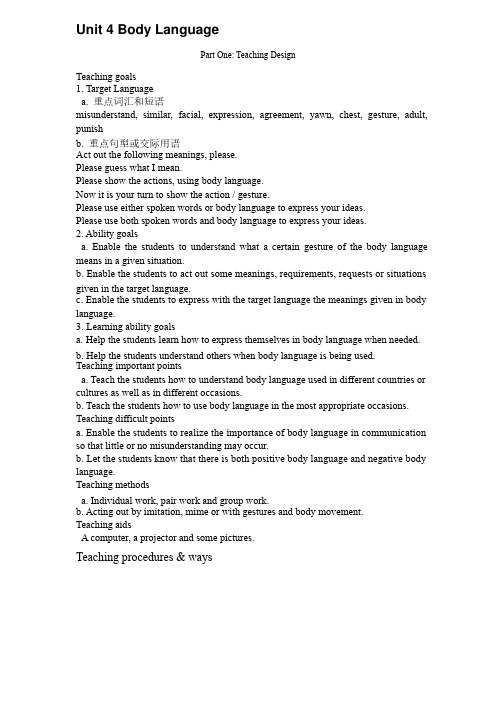
Unit 4 Body LanguagePart One: Teaching DesignTeaching goals1. Target Languagea. 重点词汇和短语重点词汇和短语misunderstand, similar, facial, expression, agreement, yawn, chest, gesture, adult, punishb. 重点句型或交际用语重点句型或交际用语Act out the following meanings, please.Please guess what I mean.Please show the actions, using body language.Now it is your turn to show the action / gesture.Please use either spoken words or body language to express your ideas.Please use both spoken words and body language to express your ideas.2. Ability goalsa. Enable the students to understand what a certain gesture of the body language means in a given situation.b. Enable the students to act out some meanings, requirements, requests or situations given in the target language.c. Enable the students to express with the target language the meanings given in body language.3. Learning ability goalsa. Help the students learn how to express themselves in body language when needed.b. Help the students understand others when body language is being used.Teaching important pointsa. Teach the students how to understand body language used in different countries or cultures as well as in different occasions.b. Teach the students how to use body language in the most appropriate occasions. Teaching difficult pointsa. Enable the students to realize the importance of body language in communication so that little or no misunderstanding may occur.b. Let the students know that there is both positive body language and negative body language.Teaching methodsa. Individual work, pair work and group work.b. Acting out by imitation, mime or with gestures and body movement.Teaching aidsA computer, a projector and some pictures.Teaching procedures & waysThe first period reading(COMMUNICATION: NO PROBLEM?)AimsTo help students develop their reading ability.To help students learn about body language.ProceduresI. Warming upWarming up by actingLook at the list of interpretation on the right side of the chart. Perform the action or the nonverbal behaviour on the left side.Examples Of Body LanguageWarming up by defining—What is body language?II. Pre-reading1. Looking and sayingLook at the man in the picture below. What does he say to you by his body language?Basically, how the ...... do I know? Or, I don’t know nothin! The shoulders are hunched and the hands are open signifying a big question mark.2. Talking and sharingBody language is the quiet, secret and most powerful language of all!According to experts, our non-verbal language communicates about 50% of what we really mean (voice tonality contributes 38%) while words themselves contribute a mere 7%.Our bodies send out messages constantly and often we don't recognize that we're communicating a lot more than we realize.Our understanding and use of non-verbal cues in facial expression are familiar to us nearly from birthIII. Reading1. Reading aloud to the recordingNow please listen and read aloud to the recording of the text COMMUNICATION: NO PROBLEM?. Pay attention to the pronunciation of each word and the pauses within each sentence. I will play the tape twice and you shall read aloud twice, too.2. Reading and underliningNext you are to read and underline all the useful expressions or collocations in the passage. Copy them to your notebook after class as homework.3. Reading to identify the topic sentence of each paragraphNext you are to skim the text to identify the topic sentence of each paragraph.4. Reading and transferring informationRead the text again to complete the table. Where is he/ she from? What does he/ she do when he/ she meet someone at the airport for the first time?Name Country Action MeaningMr GarciaJulia SmithAhmed AzizMadame Coulon5. Reading and understanding difficult sentencesAs you have read the text times, you can surely tell which sentences are difficult to understand. Now put your questions concerning the difficult points to me the teacher.6. Reading and translatingNow it’s time to translate the text into Chinese, sentence by sentence. Who will be the first to d o it?IV. Closing downClosing down by doing exercisesTo end the lesson you are to do the comprehending exercises No. 1 and 2 on page 26 and 27.Closing down by checkingC heck some of the following basic non-verbal cues and you'll recognize that you already speak and translate much of the language.“I’m surprised!” I’m shocked!” “I’m sad!”The second period Learning about Language(The ~ing form as the Attribute & Adverbial)I. Warming upWarming up by discovering useful words and expressionsTurn to page 27 and do exercises No. 1, 2 ,3 and 4 first. Check your answers against your classmates’.II. Learning about grammar1. Reading and thinkingTurn to page 25 and read with me the text of COMMUNICATION: NO PROBLEM? As you read along, pay attention to the uses of The ~ing form as the Attribute & Adverbial. (They are visitors coming from several countries. 作定语;Four people enter looking around in a curious way. 作状语;作状语; This is an exciting experience for you. 作定语; You stand watching and listening. 作状语;……)2. Doing exercises No. 1 and 2 on page 29Turn to page 29. Do exercises No. 1 and 2。
m1 Unit3
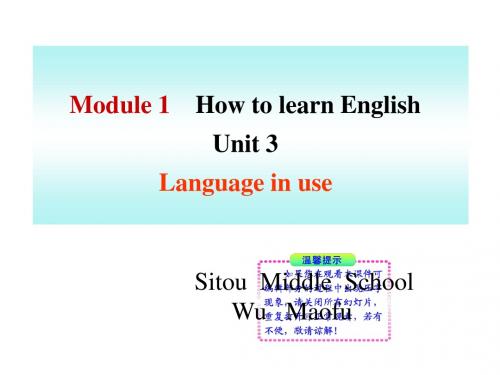
Choose the best answers.
1. — _____ good advice he gave us! — Yes. He always has so many wonderful ideas. A. What B. What a C. How D. How a
2. My pen friend, Jack, often helps me _____my English. A. on B. in C. with D. about
根据所给汉语完成下列英语句子,每空一词。 根据所给汉语完成下列英语句子 每空一词。 每空一词
1. 他和他父亲一直住在北京。 他和他父亲一直住在北京。 He lived in Beijing with his father ____ ____ _____. all the time 2. 托尼喜欢看英文电影,听英文广播。 托尼喜欢看英文电影,听英文广播。 enjoys watching Tony ______ ________ English films and ________ ___ listening to the radio in English.
10. She tried ______, but she found it difficult. A. not to worrying C. not to worry B. to not worry D. to worry not
11. — What’s your plan for the coming weekend? — ______ go to fly kites? A. Why not to C. Why don’t we B. Why don’t D. How about
B) 用括号中所给单词的适当形式填空。 用括号中所给单词的适当形式填空。
八年级英语上Module1-2练习题
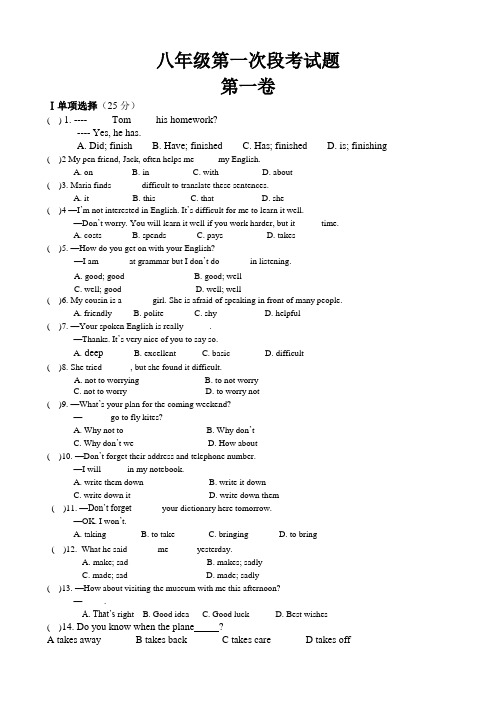
八年级第一次段考试题第一卷Ⅰ单项选择(25分)( ) 1. ---- ____ Tom ____ his homework?---- Yes, he has.A. Did; finishB. Have; finishedC. Has; finishedD. is; finishing ( )2 My pen friend, Jack, often helps me _____my English.A. onB. inC. withD. about( )3. Maria finds ______ difficult to translate these sentences.A. itB. thisC. thatD. she( )4 —I’m not interested in English. It’s difficult for me to learn it well.—Don’t worry. You will learn it well if you work harder, but it _____ time.A. costsB. spendsC. paysD. takes( )5. —How do you get on with your English?—I am ______ at grammar but I don’t do ______ in listening.A. good; goodB. good; wellC. well; goodD. well; well( )6. My cousin is a ______ girl. She is afraid of speaking in front of many people.A. friendlyB. politeC. shyD. helpful( )7. —Your spoken English is really______.—Thanks. It’s very nice of you to say so.A. deepB. excellentC. basicD. difficult( )8. She tried ______, but she found it difficult.A. not to worryingB. to not worryC. not to worryD. to worry not( )9. —What’s your plan for the coming weekend?—______ go to fly kites?A. Why not toB. Why don’tC. Why don’t weD. How about( )10. —Don’t forget their address and telephone number.—I will _____ in my notebook.A. write them downB. write it downC. write down itD. write down them( )11. —Don’t forget ______ your dictionary here tomorrow.—OK. I won’t.A. takingB. to takeC. bringingD. to bring( )12.What he said ______ me ______yesterday.A. make; sadB. makes; sadlyC. made; sadD. made; sadly( )13. —How about visiting the museum with me this afternoon?—_____.A. That’s rightB. Good ideaC. Good luckD. Best wishes( )14. Do you know when the plane ?A takes awayB takes backC takes careD takes off( )15. This song sounds .A nicelyB wonderfullyC beautifulD beautifully( )16. ---What are you going to do this weekend?--- I yet.A didn’t decidedB haven’t decidedC won’t decideD have decided( )17. --- you ever a car?---No, never.A Have, driveB Have, drivenC Do, driveD Did, driven( )18. Has she visited China ?A agoB beforeC asD since( )19. I think the price of the watch is very and I don’t have enough money.A lowB highC expensiveD cheap( )20. Linda her breakfast. She isn’t hungry now.A is eatingB ateC will eatD has eaten( )21. ---Have you finished your homework yet?--- . But I’ll finish it soon.A Yes, I haveB No, neverC CertainlyD No, I haven’t( )22 Have you your homework?A finish doingB finished to doC finish doD finished doingⅡ.完形填空(10分)Many students have a problem called test anxiety(考试焦虑症) . What will you do?Don’t 26 . When you know you have the problem, you are 27 to solve(解决) it. This problem isn’t all 28 . In some ways, it can help you. You sometimes think and do things more quickly if you are under stress(压力).29 , too many worries are bad for you. Sometimes, it 30 make you feel ill.When you are having exams and worrying about something, 31 what you’re doing and close your eyes. Tell yourself, “I can!” Then think of being at a 32 place and let your body relax. When you go 33 to the test, find questions you know the answers to and answer them 34 . This will make you feel better.The most important is to start preparation(准备) early. You can study for it three or five days 35 the test or exam. This will help you do better.( )26. A. worry B. afraid C. laugh D. frighten( )27. A. finishing B. beginning C. leaving D. making( )28. A. good B. nice C. bad D. weak( )29. A. Because B. So C. If so D. However( )30. A. must B. can C. needn’t D. has to( )31. A. write B. find C. stop D. read( )32. A. comfortable B. cold C. difficult D. strange( )33 A. away B. up C. down D. back( )34. A. last B. easily C. slowly D. first( )35. A. before B. after C. until D. atⅢ.阅读理解(20分)AOne evening I visited the English corner of our town. It is near our school. There are many trees, flowers anda nice ground there. Every evening, large numbers of people go there to practise their English, but I never went there before.When I arrived, many people were already(已经) there. I looked around and found that most of them were students. Some of them talked in English in twos and threes. To my surprise, I found three foreigners talking and smiling with some students who listened with great interest. Just then, a tall student came to me and asked, “Shall we have a talk in English?” My heart beat very fast at that moment because it was the first time for me to visit the English corner. Anyway, I said “Yes”. Soon we talked freely about our studies, lives, hobbies as well as our problems of learning English. Time went fast, and it was already 11 o’clock before I realized it. I enjoyed myself there and was glad to learn a lot at the English corner. I und erstood the famous saying “Practice makes perfect.” ( )36. Why large numbers of people go to the English corner?A. Because they would like to visit that nice ground there.B. Because they would like to improve their English.C. Because they would like to make friends with foreigners.D. Because they would like to have a talk in Chinese with others.( )37. Most of people were _____ in the English corner.A. workersB. teachersC. foreignersD. school students( ) 38. The writer talked with a student about their _____ in English.A. homework, lives, hobbies as well as problems of learning mathsB. friends, lives, hobbies as well as problems of learning ChineseC. teachers, lives, hobbies as well as problems of learning EnglishD. studies, lives, hobbies as well as problems of learning English( )39. What’s the meaning of “Practice makes perfect.”?A. 实践出真知B. 身体力行C. 熟能生巧D. 完美无缺( 40. Which of the statements is NOT true according to the passage?A. Three foreigners talked with some students.B. A tall foreigner came to the writer and talked with him in English.C. The writer went to the English corner for the first time.D. The writer had a good time in the English corner.BA dictionary is very important for the learners of English. A good English learner should know how to use a dictionary.First find a good dictionary. We usually use two kinds of dictionaries—one is English-Chinese dictionaries, and the other is Chinese-English dictionaries. Since you do not know much English yet, you should choose an English-Chinese dictionary which not only gives you the meaning of the English words in Chinese but also gives you some explanations.When you see a new word, do not use the dictionary immediately (立刻). Try to guess what it means before you look it up in the dictionary. If you cannot, then look up the word in the dictionary. Words in dictionaries are alphabetically (照字母次序) arranged (排列).The dictionary usually tells you—(1) the spelling of the word; (2) the pronunciation of the word; (3) the different meanings of the word; (4) the different ways in which the word is used in sentences. All the information is useful.( )41. A dictionary is very important for a student to learn _______.A. chemistryB. EnglishC. mathsD. physics( )42. The passage tells us that a student who does not know much English should choose ________.A. a Chinese-English dictionaryB. a good English teacherC. an English-Chinese dictionaryD. a thick English book ( )43. If we find a new word when we read, we _______.A. should ask classmates at onceB. should ask the English teacher at onceC. should not use the dictionary at onceD. should use the dictionary at once( )44. If we cannot guess what a new word means, _______.A. we may look up the word in a dictionaryB. we should give up readingC. we should stop reading at onceD. we should write it down on a piece of paper( )45. Which of the following is NOT mentioned according to the passage?A. A dictionary usually tells us how to use a dictionary.B. A dictionary usually tells us the different meanings of the word.C. A dictionary usually tells us the pronunciation of the word.D. A dictionary usually tells us the spelling of the word.Ⅳ. 任务型阅读(10分)In the school, I’m a clever girl. I can speak English very well. My classmates always ask me how to learn English. OK. Let me tell you. Speaking, listening and writing are very important.If you want to speak English very well, you should read fast and loudly. If you do this for about three months, you can speak English like a foreigner.If you want to be good at English, you can’t ignore(忽视) listening. When you talk with others, you should listen to them carefully. If you don’t pay attention to the dialogue, you will miss out a lot of things.Writing is also very important. When you learn a new word, you’d better make a sentence or more. It can expand(扩大) your vocabulary.You see, English is not very difficult. If you are interested in English and work hard, you will find it easy.根据短文内容完成下面的表格。
新技能英语-高级教程教案 unit7
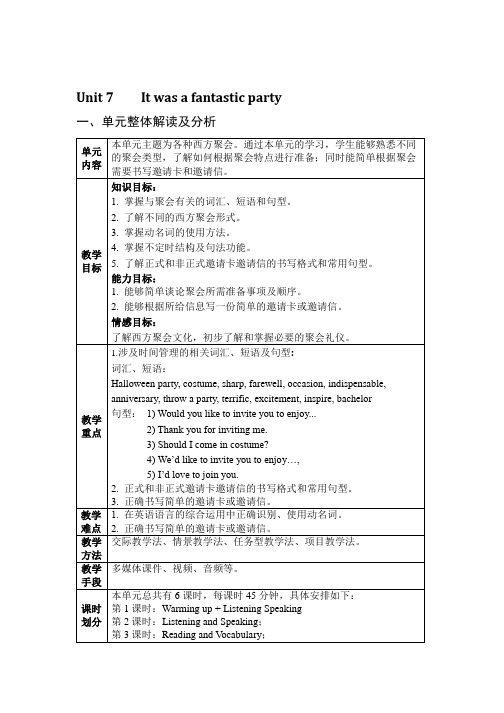
Unit 7 It was a fantastic party 一、单元整体解读及分析二、分课时教学设计Supplementary materials1. Word attack1)costume n.the set of clothes worn while people are performing. 戏装服装,装束;戏装,剧装e.g.The performers, in costume and makeup, were walking up and downbackstage.上了妆穿着戏服的演员在后台走来走去。
2)sharp adv. exactly at the stated time 整点e.g.The party will start at 7:00 pm sharp. 聚会于晚上七点整开始。
3) by the way adv. introducing a different topic 顺便一提e.g. By the way, have you done anything behind my back? 顺便问一下,你背着我干了什么?2. Useful expressionsTalk about the way of inviting1) Would you like to invite you to enjoy...2) Thank you for inviting me.3) Should I come in costume?4) We’d like to invite you to enjoy…,5) I’d love to join you.1. Introduction of HalloweenHalloween is an annual holiday observed on October 31, which commonly includes activities such as trick-or-treating, attending costume parties, carving jack-o'-lanterns, bonfires, apple bobbing, visiting haunted attractions, playing pranks, telling scary stories, and watching horror films.Historian Nicholas Rogers, exploring the origins of Halloween, notes that while "some folklorists have detected its origins in the Roman feast of Pomona, the goddess of fruits and seeds, or in the festival of the dead called Parentalia, it is more typically linked to the Celtic festival of Samhain". The name is derived from Old Irish and means roughly "summer's end". Snap-Apple Night (1832) by Daniel Maclise depicts apple bobbing and divination games at a Halloween party in Blarney, Ireland. The name 'Halloween' and many of its present-day traditions derive from the Old English era.The word Halloween is first attested in the 16th century and represents a Scottish variant of the fuller All-Hallows-Even ("evening"), that is, the night before All Hallows Day. Although the phrase All Hallows is found in Old English, All-Hallows-Even is itself not attested until 1556.2. Word attack1)fall asleep v. change from a waking to a sleeping state入睡;睡着e.g. After changing the bed, I would fall asleep quickly. 换了一张床,我很快就能睡着了。
英语论文-浅谈英语长句的汉语翻译

浅谈英语长句的汉语翻译[Abstract] The aim of this essay is to tell us how to translate English long sentences into Chinese correctly and precisely. It contains the comparison between English and Chinese long sentences, and defines English long sentence. The common types of English long sentences are classified in the essay, and it also explains why and where long English sentences are used respectively. In the third part of the essay, we proposes the steps and methods in translating long English sentence. In conclusion part, we points out the key to become a good translator is to read and practice as much as possible, and also mentions the similar ways in translating Chinese long sentences to English. [Key Words] long sentences; understanding; expressing; translating【摘要】本论文主要是向大家介绍如何准确到位的将英语长句翻译为中文。
作者比较了中英文句子结构和表达的不同特点,同时对英语长句作了定义,对常见的几种英文长句作了说明,并且分别介绍了英语长句发生的原因和背景。
新思路大学英语基础教程第一册(第二版)教案unit4

For example:part-time jobs, volunteer work, sports, student club activities, reading,etc.
2)In the first question, if your answer is “YES”, could you please share your experience andwhat have you got from your extracurricularactivities?
5 mins
Conversation
1.Pre-listening
Step 1
Introduce the background information aboutNational Fitness dayby showing the pictures.
Step 2
Pronounce the new vocabulary and key sentences for the class to repeat and explain some of difficulties.
Step4Teacherasks students to read the new words in the conversation according to thephonetic symbolslearned above.
14 mins
Homework
1) Studentsfurther explore their after-class activities and share it with their partner.
5 mins
英汉翻译学习Lesson3
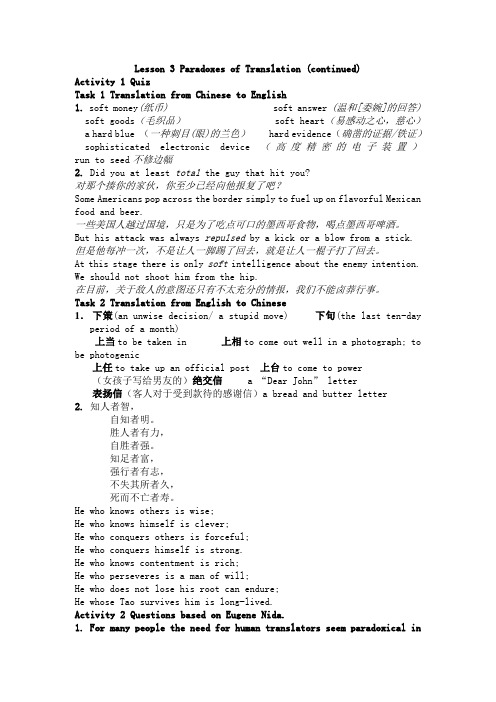
Lesson 3 Paradoxes of Translation (continued)Activity 1 QuizTask 1 Translation from Chinese to English1. soft money(纸币) soft answer (温和[委婉]的回答) soft goods(毛织品) soft heart(易感动之心,慈心)a hard blue (一种刺目(眼)的兰色) hard evidence(确凿的证据/铁证)sophisticated electronic device (高度精密的电子装置)run to seed不修边幅2. Did you at least total the guy that hit you?对那个揍你的家伙,你至少已经向他报复了吧?Some Americans pop across the border simply to fuel up on flavorful Mexican food and beer.一些美国人越过国境,只是为了吃点可口的墨西哥食物,喝点墨西哥啤酒。
But his attack was always repulsed by a kick or a blow from a stick. 但是他每冲一次,不是让人一脚踢了回去,就是让人一棍子打了回去。
At this stage there is only soft intelligence about the enemy intention. We should not shoot him from the hip.在目前,关于敌人的意图还只有不太充分的情报,我们不能卤莽行事。
Task 2 Translation from English to Chinese1.下策(an unwise decision/ a stupid move) 下旬(the last ten-day period of a month)上当to be taken in 上相to come out well in a photograph; to be photogenic上任to take up an official post 上台to come to power(女孩子写给男友的)绝交信 a “Dear John” letter表扬信(客人对于受到款待的感谢信)a bread and butter letter2. 知人者智,自知者明。
- 1、下载文档前请自行甄别文档内容的完整性,平台不提供额外的编辑、内容补充、找答案等附加服务。
- 2、"仅部分预览"的文档,不可在线预览部分如存在完整性等问题,可反馈申请退款(可完整预览的文档不适用该条件!)。
- 3、如文档侵犯您的权益,请联系客服反馈,我们会尽快为您处理(人工客服工作时间:9:00-18:30)。
1.Do you have a family? 你有孩子吗?
2.It's a good father that knows his son。
就算是最好的父亲,也未必了解自己的儿子。
3.I have no opinion of that sort of man。
我对这类人很反感。
4.He put 5 dollars into my hand,"you have been a great man today."他把5美圆塞到我手上说:“你今天表现得很好。
”
5.I was the youngest son, and the youngest but two。
我是最小的儿子,但我还有两个妹妹。
6.The picture flattered her。
她比较上照。
7.The country not agreeing with her, she returned to England。
她在那个国家水土不服,所以回到了英国。
8.He is a walking skeleton。
他很瘦。
9.The machine is in good repair。
机器已经修好了。
10.He allowed the father to be overruled by the judge, and declared his own s on guilty。
他让法官的职责战胜了父子的亲情,最终宣布儿子有罪。
11.You don't know what you are talking about。
你在胡说八道。
12.You don't begin to understand what they mean。
你根本不知道他们在干嘛。
(not begin to:毫不)
13.They didn't praise him slightly。
他们大大地表扬了他。
14.That's all I want to hear。
我已经听够了。
15.I wish I could bring you to see my point。
你要我怎么说你才能明白呢。
16.You really flatter me。
你让我受宠若惊。
17.He made a great difference。
有他没他结果完全不一样。
18.You cannot give him too much money。
你给他再多的钱也不算多。
19.The long exhausting trip proved too much。
这次旅行旷日持久,我们都累倒了。
20.You look darker after the holiday。
你看上去更健康了。
21.As luck would have it, he was caught by the teacher again。
不幸的是,他又一次被老师逮个正着。
22.She held the little boy by the right hand。
她抓着小男孩的右手。
(这里"by"与" with"动作主语完全相反)
23.Are you there?等于句型:Do you follow me?
24.If you think he is a good man, think again。
如果你认为他是好人,那你就大错特错了。
25.She has blue eyes。
她长着双蓝眼睛。
26.That took his breath away。
他大惊失色。
27.Two is company but three is none。
两人成伴,三人不欢。
28.The elevator girl reads between passengers。
开电梯的姑娘在没有乘客时看书。
"between"="without":相同用法:She modeled between roles。
译成:她不演戏时去客串下模特。
29.Students are still arriving。
学生还没有到齐。
30.I must not stay here and do nothing。
我不能什么都不做待在这儿。
31.They went away as wise as they came。
他们一无所获。
32.I won't do it to save my life。
我死也不会做。
33.Nonsense, I don't think his painting is any better than yours。
胡说,我认为他的画比你好不到哪去。
34.Traditionally, Italian presidents have been seen and not heard。
从传统上看,意大利总统有名无权。
35.Better late than the late。
晚了总比完了好/迟到总比丧命好。
36.You don't want to do that。
你不应该去做。
37.My grandfather is nearly 90 and in his second childhood。
我祖父快90岁了,什么事都需要别人来做。
38.Work once and work twice。
一次得手,再次不愁。
39.Rubber easily gives way to pressure。
橡胶很容易变形。
40.If my mother had known of it she'd have died a second time。
要是我妈妈知道了,她会从棺材里爬起来。
